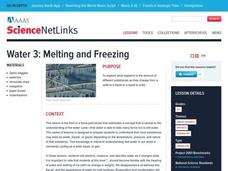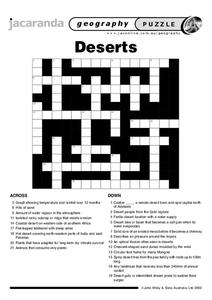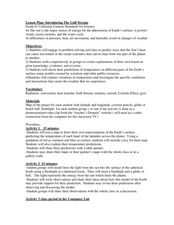Curated OER
Properties of Matter
Students describe four states of matter and their characteristics, explain thermal expansion of matter, interpret state changes in terms of kinetic theory of matter, explain relationship between temperature and volume of a gas, state...
Curated OER
Melting and Freezing
Young scholars explore how various substances change from a solid to a liquid or from a liquid to a solid and how temperature, pressure and nature play an important role in this process. In this melting and freezing...
Curated OER
How Pollution Disrupts Our Natural Environment
Students conduct experiments to illustrate global warming. In this air pollution instructional activity, students first examine how a layer of greenhouse gasses might impact the earth's atmospheric temperature, then evaluate how the...
Curated OER
Create a Cloud in a Bottle
Students look at how clouds form. In this cloud lesson, students make a cloud using water, 2 liter bottles and a match. They watch how the pressure and temperature changes the atmosphere in the bottle to create a cloud.
Curated OER
The Big Crush
Students examine weather maps from their state from the past few days. They examine the Highs and Lows on the maps to determine what kind of weather they produce. They use that information to better prepare for their activities and what...
Curated OER
Weather Review
In this weather worksheet, students reviews terms associated with measuring different weather phenomena plus draw examples of different types of fronts on a weather map. This worksheet has 5 true or false, 15 matching, 21 multiple...
Curated OER
Physical Characteristics of the Troposphere
Students examine troposphere graphs and mcompare their hypotheses with data collected by weather balloons launched from the NOAA ship, Ronald H. Brown. they write summaries about the physical properties of the troposphere.
Curated OER
Deserts Puzzle
In this geography worksheet, students complete a crossword puzzle referring all to deserts. They identify the various types of desert land and what plants and animals can survive in these lands. Also, students identify the people who...
Curated OER
You Can Be A Woman Meteorologist
Students complete four activities that are about meteorology. The first activity is for them to explore weather maps. The second activity is for students to discover high-pressure and low-pressure air. The third activity is for them to...
Curated OER
Weather Art in Space Settlements
Students demonstrate a cloud formation and the relation between pressure and temperature in gases. They explain how clouds could be created in space settlements and see the relation between pressure and temperature in gases.
Curated OER
Science: What Is a Barometer?
Fourth graders discover how barometers help to predict the weather. Using newspapers, they examine the weather forecast and determine the meaning of high and low as they pertain to pressure. After making cluster diagrams, 4th graders...
Curated OER
Review For Weather Quiz 2
In this science worksheet, students look at the information carefully in preparation for a formal assessment. The focus is upon defining different aspects of air masses.
Curated OER
Cold Fronts And Warm Fronts
Students simulate the movement of cold and warm fronts as they listen to a story about the weather and Mr. Sun. They brainstorm the characteristics of each type of front then write about which front they would prefer if they were a...
Curated OER
Using Standard Deviation, part 2
Pupils explain and learn the practical application of standard deviation. They compare cities in the U.S. and discover whether cities closer to the ocean have more consistent temperatures. Useful resources are given.
Curated OER
The Drag of Drag
Pupils are introduced to drag. Then they summarize drag by saying that the drag is proportional to the square of the velocity. Students then solve problems an example of such a problem: Explain why swimming underwater is faster than...
Curated OER
(S-1A) Weather and the Atmosphere
Students discuss the way vertical convection transports heat from the surface upwards, and associated pressure and temperature profiles of the atmosphere.
Curated OER
Boyle's Law
Students work in small groups and use a hand-held vacuum pump with a balloon under the dome with some air. Another deflated balloon is attached to the end where the air goes out. As the air is drawn out of the dome the first balloon with...
Curated OER
Gas Laws Experienced
Young scholars discover relationship between temperature pressure and volume as they perform research and experiments.
Curated OER
What is Climate?
In this weather worksheet, students read a brief excerpt that compares the various types of climates found on Earth. Then they explain where the low- and high-pressure systems follow each other throughout the year.
Curated OER
Thermodynamics Homework Problem Set
In this chemistry worksheet, students determine the equilibrium pressure of NO at each temperature listed. Then they explain why lowering the combustion temperature would have any effect on the NO emission. Students also use the values...
Curated OER
Winter and Summer Storms Scenarios
Fourth graders analyze how summer and winter storms are different. In this weather instructional activity, 4th graders construct a winter storm simulation box and a summer storm bottle and record the temperature and barometer readings....
Curated OER
Lesson 5: Boyle's Law
Students participate in a lab to verify Boyle's Law using applied force (weight) to do work on a closed isolated system of air. "Elasticity of Gases Apparatus, BASIX" from Sargent-Welch is the syringe apparatus used to measure volume...
Curated OER
Introducing The Gulf Stream
Sixth graders research the average temperatures of different places on Earth. In this earth science lesson, 6th graders explain how the sun's heat cause ocean movement. They discuss how temperature change affects the weather we experience.
Curated OER
Water 3: Melting and Freezing
Students understand that most substances may exist as solids, liquids, or gases depending on the temperature, pressure, and nature of that substance. This knowledge is critical to understanding that water in our world is constantly...

























